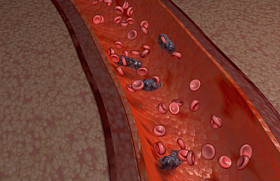 Bacterial contamination is the most common infectious risk of blood products. It now may be possible to predict patient survival following community-acquired sepsis by using clinical features and metabolomics, according to new research published in the journal Science Translational Medicine. Researchers found that the plasma metabolomes and proteomes of patients who ultimately died from sepsis differed significantly from those who would survive. Specifically, they found differences in proteins and metabolites involved in fatty acid transport and β-oxidation, gluconeogenesis, and the citric acid cycle. These differences were found to increase over time as death approached. An algorithm based upon five of these metabolites and clinical features may help to guide patient-specific treatment of sepsis.
Bacterial contamination is the most common infectious risk of blood products. It now may be possible to predict patient survival following community-acquired sepsis by using clinical features and metabolomics, according to new research published in the journal Science Translational Medicine. Researchers found that the plasma metabolomes and proteomes of patients who ultimately died from sepsis differed significantly from those who would survive. Specifically, they found differences in proteins and metabolites involved in fatty acid transport and β-oxidation, gluconeogenesis, and the citric acid cycle. These differences were found to increase over time as death approached. An algorithm based upon five of these metabolites and clinical features may help to guide patient-specific treatment of sepsis.
Reference
